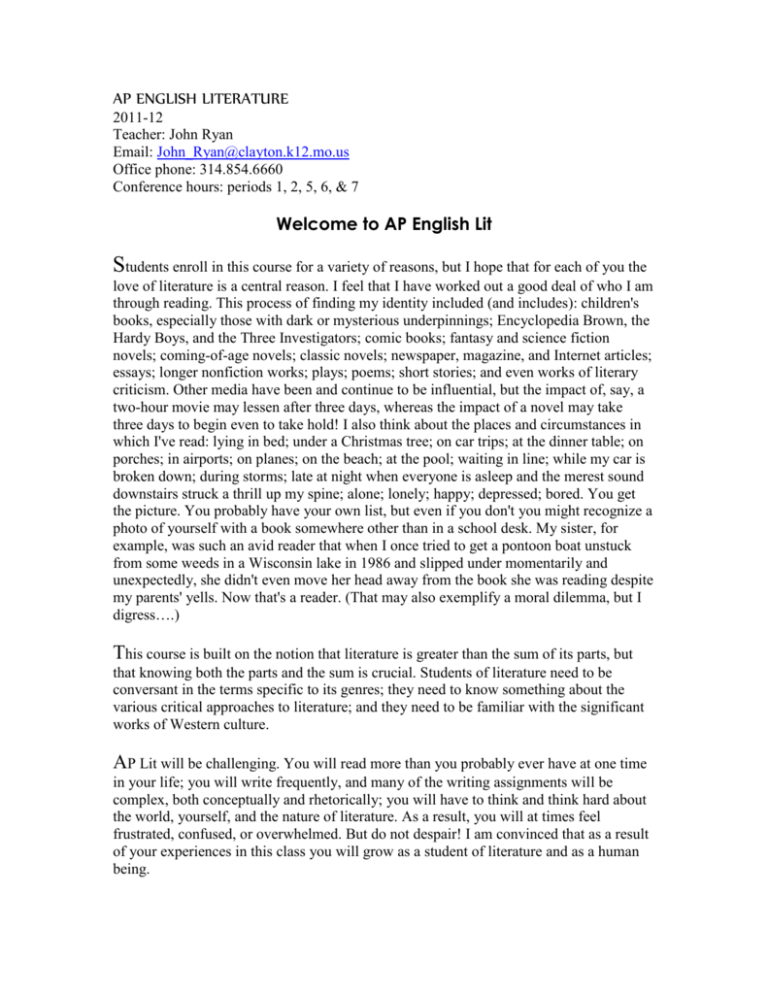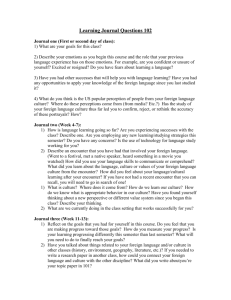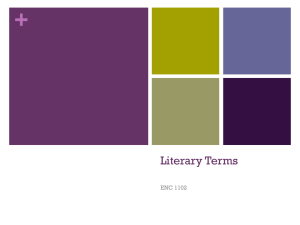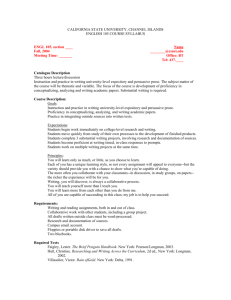AP English Lit - School District of Clayton
advertisement

AP ENGLISH LITERATURE 2011-12 Teacher: John Ryan Email: John_Ryan@clayton.k12.mo.us Office phone: 314.854.6660 Conference hours: periods 1, 2, 5, 6, & 7 Welcome to AP English Lit Students enroll in this course for a variety of reasons, but I hope that for each of you the love of literature is a central reason. I feel that I have worked out a good deal of who I am through reading. This process of finding my identity included (and includes): children's books, especially those with dark or mysterious underpinnings; Encyclopedia Brown, the Hardy Boys, and the Three Investigators; comic books; fantasy and science fiction novels; coming-of-age novels; classic novels; newspaper, magazine, and Internet articles; essays; longer nonfiction works; plays; poems; short stories; and even works of literary criticism. Other media have been and continue to be influential, but the impact of, say, a two-hour movie may lessen after three days, whereas the impact of a novel may take three days to begin even to take hold! I also think about the places and circumstances in which I've read: lying in bed; under a Christmas tree; on car trips; at the dinner table; on porches; in airports; on planes; on the beach; at the pool; waiting in line; while my car is broken down; during storms; late at night when everyone is asleep and the merest sound downstairs struck a thrill up my spine; alone; lonely; happy; depressed; bored. You get the picture. You probably have your own list, but even if you don't you might recognize a photo of yourself with a book somewhere other than in a school desk. My sister, for example, was such an avid reader that when I once tried to get a pontoon boat unstuck from some weeds in a Wisconsin lake in 1986 and slipped under momentarily and unexpectedly, she didn't even move her head away from the book she was reading despite my parents' yells. Now that's a reader. (That may also exemplify a moral dilemma, but I digress….) This course is built on the notion that literature is greater than the sum of its parts, but that knowing both the parts and the sum is crucial. Students of literature need to be conversant in the terms specific to its genres; they need to know something about the various critical approaches to literature; and they need to be familiar with the significant works of Western culture. AP Lit will be challenging. You will read more than you probably ever have at one time in your life; you will write frequently, and many of the writing assignments will be complex, both conceptually and rhetorically; you will have to think and think hard about the world, yourself, and the nature of literature. As a result, you will at times feel frustrated, confused, or overwhelmed. But do not despair! I am convinced that as a result of your experiences in this class you will grow as a student of literature and as a human being. The course will focus on the following broad, interconnected themes: Unit One: Who Am I? The Search for Identity; Perception in Personal and Literary Contexts A question every human faces it that of identity: one's self-definition encompassing values, interests, dreams, and perceptions. The shaping of a person's identity may happen in a burst, as when a leap in cognitive development occurs, a traumatic event imposes itself, or a profound changing experience happens. Additionally, a person's identity may change gradually, through conscious—and even unconscious—shaping. Then there is the rare individual whose identity is fixed at an early age and appears to be constant throughout his/her life. No matter the situation, most people spend some time searching, paradoxically, for themselves. One vehicle facilitating the search for identity is literature. Authors experiment with point of view, style, and tone: elements in the quest for identity of characters within and also readers without. How to approach a text—how to discuss it, how to evaluate it, how to use it—are issues for any readers hoping to know both the text and themselves. Essential Questions •Who and what gives us our identity? •What happens when identities collide? •How do different ways of seeing a text (i.e., critical lenses) affect one's sense of self? •What role does language play in shaping and/or revealing identity? Major Texts Invisible Man, Ralph Ellison The Handmaid's Tale, Margaret Atwood The Importance of Being Earnest, Oscar Wilde Additional poems, short stories, and/or essays Independent Reading Options One text is required each semester. You should read one book from either this list or the Unit Two Independent Reading Assignment (IRA) list by December 5. [Assignment sheet given separately.] Sherman Alexie. The Lone Ranger and Tonto Fistfight in Heaven Russell Banks. Rule of the Bone T.C. Boyle. Drop City Willa Cather. My Antonia Michael Chabon. The Amazing Adventures of Kavalier and Clay Raymond Chandler. The Big Sleep or The Long Goodbye J. M. Coetzee. The Life and Times of Michael K or Elizabeth Costello Douglas Coupland. Generation X Phillip K. Dick. Do Androids Dream of Electric Sheep? Michael Dorris. A Yellow Raft in Blue Water William Faulkner. Light in August Jonathan Safran Foer. Extremely Loud & Incredibly Close or Everything is Illuminated Thomas Hardy. Jude the Obscure Robert Heinlein. Stranger in a Strange Land Henrik Ibsen. A Doll's House Kazuo Ishiguro. The Remains of the Day Henry James. The Portrait of a Lady Gish Jen. Typical American Charles Johnson. Middle Passage Milan Kundera. The Unbearable Lightness of Being Nella Larsen. Passing Malcolm Lowry. Under the Volcano Colum McCann. Zoli Rick Moody. The Ice Storm Toni Morrison. Sula or Tar Baby V. S. Naipaul. Miguel Street Gloria Naylor. The Women of Brewster Place Tim O'Brien. Tomcat in Love Kenzaburo Oe. The Silent Cry Annie Proulx. The Shipping News Thomas Pynchon. The Crying of Lot 49 Richard Rodriguez. Hunger of Memory Amy Tan. The Joy Luck Club David Foster Wallace. Brief Interviews with Hideous Men Unit Two: What is Truth? Narrative Traditions; Illusion and Reality "Truth" includes both metaphysical and narrative dimensions. How to live an authentic life is the central metaphysical concern; how to read a narrative in which past/present/future merge, retellings of the same event occur, and ambiguity reigns supreme, are its narrative concerns. Additionally, language can be used to hide truth as well as to illuminate it. Essential Questions •What is truth? Is it absolute or relative? •What is the relationship between language and truth? •How willing are we to embrace truth? •What if a "truth" impels us to violate an essential element of our self-concept? •Do texts present truths and also undermine them? Major Texts Choice of Jane Austen's Pride and Prejudice or Charles Dickens' A Tale of Two Cities Hamlet, William Shakespeare As I Lay Dying, William Faulkner Additional poems, short stories, and/or essays Independent Reading Options Margaret Atwood. The Blind Assassin John Barth. The Sot-Weed Factor Italo Calvino. Invisible Cities or If on a Winter's Night a Traveler Truman Capote. In Cold Blood Don DeLillo. Libra E. L. Doctorow. Ragtime William Faulkner. Absalom, Absalom or The Sound and the Fury Ernest Gaines. A Gathering of Old Men Gabriel Garcia-Marquez. One Hundred Years of Solitude; Chronicle of a Death Foretold Dashiell Hammett. The Maltese Falcon Herman Melville. Benito Cereno Kazuo Ishiguro. An Artist of the Floating World or When We Were Orphans Mario Vargas Llosa. The Real Life of Alejandro Mayta Toni Morrison. Jazz; Beloved Joyce Carol Oates. Expensive People Tim O'Brien. In the Lake of the Woods George Orwell. 1984 Erich Maria Remarque. All Quiet on the Western Front Jean Toomer. Cane Kurt Vonnegut. Slaughterhouse Five Virginia Woolf. To the Lighthouse Unit Three: How do we make moral choices? The Nature of Good and Evil and What is the nature of a good life? Finding Purpose Beginning at the age of six or seven, people grapple with the issues of good and evil. The conscience—the moral sense—guides people in making judgments about actions, labeling some actions good and others evil. Historically, cultures have determined what is good and what is evil, codifying some of these decisions in laws or precepts. This unit will examine situations involving moral choices. It will challenge you to examine your own moral code. Additionally, this unit will address the question all people face of how to live a meaningful existence. For some, "meaningful" means being financially secure; for others, it means adhering to family traditions and values; for still others, it means challenging the status quo or working within the system to enact change. For the existentialists, existence imposes the paradoxical burden of freedom: people have the challenge of creating their own meaning, apart from meanings prescribed for them by community, family, or country. Essential Questions •What are good and evil? Is evil an intrinsic element of human nature? •What happens when moral systems collide? •What's the difference between sin and crime? •How does narrative point of view affect the presentation of good and evil? •What is a good life? What gives life meaning? •What does your generation see as its mission, and what do you yourself see as yours? Major Texts The Inferno excerpts, Dante Aligheri Heart of Darkness, Joseph Conrad Poetry anthology All the King's Men, Robert Penn Warren Waiting for Godot, Samuel Beckett Joseph Heller's Catch-22 or Don DeLillo's White Noise Independent Reading Options One text is required each semester. You should read one book from the following two lists by the end of the semester. (Details 2nd semester) Chinua Achebe. Things Fall Apart Martin Amis. Time's Arrow Russell Banks. The Sweet Hereafter Paul Bowles. The Sheltering Sky Charlotte Bronte. Jane Eyre James M. Cain. Double Indemnity J. M. Coetzee. Disgrace Joseph Conrad. Heart of Darkness John Gregory Dunne. True Confessions Theodore Dreiser. Sister Carrie Gustave Flaubert. Madame Bovary E. M. Forster. A Passage to India Graham Greene. The Quiet American or The Heart of the Matter Thomas Hardy. Tess of the D'Urbervilles or Jude the Obscure Aldous Huxley. Brave New World Ha Jin. War Trash C. S. Lewis. The Screwtape Letters Cormac McCarthy. Blood Meridian Herman Melville. Billy Budd Kenzaburo Oe. Nip the Buds, Shoot the Kids Suzan-Lori Parks. Topdog/Underdog Bernhardt Schlink. The Reader Mary Wollstonecraft Shelley. Frankenstein Upton Sinclair. The Jungle Thomas Pynchon. V. Voltaire. Candide Nathaniel West. The Day of the Locust Tom Wolfe. The Bonfire of the Vanities Richard Wright. Native Son James Agee. A Death in the Family James Baldwin. Go Tell It on the Mountain Russell Banks. Affliction T. C. Boyle. The Tortilla Curtain or World's End Italo Calvino. The Baron in the Trees or Invisible Cities Albert Camus. The Stranger or The Plague John Cheever. Falconer Charles Dickens. Great Expectations Fyodor Dostoevsky. The Brothers Karamazov Roddy Doyle. A Star Called Henry Dave Eggers. A Heartbreaking Work of Staggering Genius Henry Fielding. Tom Jones William Golding. The Inheritors Graham Greene. The Power and the Glory Kent Haruf. Plainsong Ernest Hemingway. The Sun Also Rises John Irving. A Prayer for Owen Meany or The Cider House Rules Mary Karr. The Liar's Club Jack Kerouac. On the Road Milan Kundera. The Joke or Life is Elsewhere Bernard Malamud. The Fixer W. Somerset Maugham. The Painted Veil Jay McInerney. Bright Lights, Big City Walker Percy. The Moviegoer or Lost in the Cosmos Sylvia Plath. The Bell Jar Tom Robbins. Even Cowgirls Get the Blues Jose Saramago. Blindness Jonathon Swift. Gulliver's Travels Course Objectives, Policies, and Assessments Overview AP English Literature is designed, in part, to prepare you to take the AP English Literature/Composition exam. This exam emphasizes the skills of close reading and style analysis. This course, then, will give you the opportunity to hone your skills of style analysis, make you more comfortable with poetry—both appreciation and analysis—and give you practice in writing both at-home and in-class responses to literature. Beyond the exigencies of AP preparation, however, the course is built on lifelong objectives. I want you to: 1. learn to love literature and encounter some texts that speak to you; 2. feel more comfortable about reading, writing, and speaking; 3. know where to obtain information and how to organize and synthesize that information; 4. work effectively in small and large groups; 5. explore your moral code and value system through reading, writing, and discussing; 6. understand others, especially those of a different race, gender, or background, through reading, writing, and discussing; 7. come to a clearer sense of your own identity and the meaning of your life. The Nitty-Gritty 1. Type all conference/final drafts. 2. Prepare conference drafts and revisions using MLA format for heading, title, and pagination. 3. You may request one one-day extension of a paper due date per semester, but the request must occur at least a day before the due date. I would prefer that you ask in class or in my office, but if necessary you may call or email me. 4. I will grade a number of the ten required conferenced papers using the 50-50 method: 50 points for the first draft, 50 points for the revision. I do not give a separate grade for conference attendance, but I will deduct 10 points for an unexcused missed conference from the final draft grade. Late first or final drafts lose 5 points per day late. Please avoid losing points by instead talking to me about problems with drafts, conference times, or other obligations. I can negotiate with you or understand your situation if you let me know! 5. Be sure to let me know at least one day in advance if you plan to meet with a college representative during this class period. 6. You must be responsible in general. Part of that responsibility means limiting your absences for any reason. If you plan to visit colleges, remember that your parent must write a letter to the principal requesting that privilege prior to making the visit. As a courtesy to your teachers, please give us advance notice as well. 7. The conference and final drafts of the author research paper will be due before winter break. I will give you an assignment sheet later. 8. Academic Honesty: I have zero tolerance for plagiarism, cheating, and other dishonest acts. I expect that the work you turn in, be it homework or a composition, is your own work. Any plagiarized work will result in an automatic zero grade with no makeup, plus notification of counselor, administrator, and parent. We will discuss the importance of academic integrity in class. (Please see attached "English Department Statement on Academic Integrity.") Tentative Conferenced Writing Assignments (academic quarter in parens.) 1. College Essay (1st) 2. Thesis, Outline, and Working Bibliography for Research Paper (1st) 3. Style Analysis/Close Reading (2nd) 4. Research Paper (2nd) 5. Introduction to Research Author (3rd) 6. Parody of The Inferno/other alternative assignment (3rd) 7. AP Question—Poetry (3rd) 8. AP Question—Prose (4th) 9. Purposes of Satire (4th) ADDITIONAL ASSIGNMENTS & ACTIVITIES Homework Expect daily homework, whether reading, writing, or a combination of the two. (Always think.) Unless otherwise specified, homework assignments I check in class will be worth 5 points. Homework turned in up to one day late will be worth 2 points. Generally, I do not accept homework later than one day, and I’ll frown when I tell you so. Tests and Quizzes Tests will be worth various points, usually ranging from 50–90 points. Quizzes will be worth various points, usually ranging from 10-15 points. In-Class Responses/In-Class Essays You will write a number of responses to literature in class. These are generally worth 10– 20 points. Some of these responses may be more expansive, detailed, or difficult. Let’s call these “in-class essays” and make them worth more points, shall we? Discussion Discussion fuels this class. If you sit back and don’t take part long enough, we’ll all know. Jump in, give us your two bits. I’m not in the habit of grading discussions, but I might just get prickly and decide to start. Grammar is not a dirty word and is a subject of our study. There. Poetry Presentations Beginning in February and continuing into March, you will present (in pairs) analyses of two poems—one classic, the other post-WWII—to our class. Research Author Introductory Composition The goal of this essay is to provide us with the biography relevant to the development of your author as an artist and explore the significance of the artist and his/her works. Final Exam Expect a final exam at the end of first semester. If you take the AP Lit exam in May, you will be excused from the second-semester final exam. Grading Scale The overall grading scale for the course is the following: 98-100 = A+ 94-97 = A 90-93 = A- 88-89 = B+ 84-87 = B 80-83 = B- 78-79 = C+ 74-77 = C 70-73 = C- 68-69 = D+ 64-67 = D 60-63 = D






